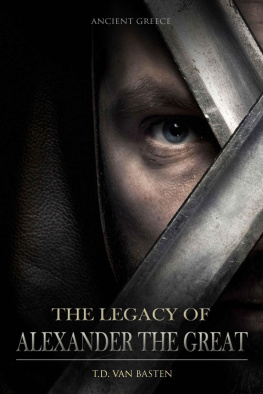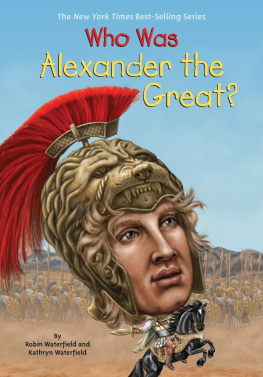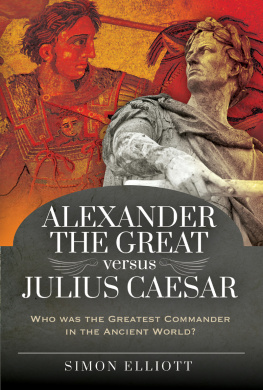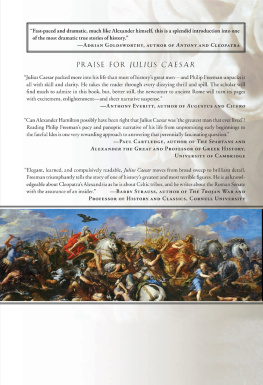ALEXANDER THE GREAT

T.D. van Basten
2016 All Rights Reserved
Copyright 2016 by T.D. van Basten - All rights reserved.
This document is geared towards providing exact and reliable information in regards to the topic and issue covered. The publication is sold with the idea that the publisher is not required to render accounting, officially permitted, or otherwise, qualified services. If advice is necessary, legal or professional, a practiced individual in the profession should be ordered.
- From a Declaration of Principles which was accepted and approved equally by a Committee of the American Bar Association and a Committee of Publishers and Associations.
In no way is it legal to reproduce, duplicate, or transmit any part of this document in either electronic means or in printed format. Recording of this publication is strictly prohibited and any storage of this document is not allowed unless with written permission from the publisher. All rights reserved.
The information provided herein is stated to be truthful and consistent, in that any liability, in terms of inattention or otherwise, by any usage or abuse of any policies, processes, or directions contained within is the solitary and utter responsibility of the recipient reader. Under no circumstances will any legal responsibility or blame be held against the publisher for any reparation, damages, or monetary loss due to the information herein, either directly or indirectly.
Respective authors own all copyrights not held by the publisher.
The information herein is offered for informational purposes solely, and is universal as so. The presentation of the information is without contract or any type of guarantee assurance.
Introduction
Alexander III of Macedon, better known to the world as Alexander the Great, was one of the most powerful rulers of the ancient world. During his time, he amassed the largest amount of land that the Greek empire would ever see. He seemed to capture land with ease and managed to spread the culture and language of the Greek empire far and wide, ushering in what is referred to as the Hellenic Period.
Born the son of King Philip II of Macedon and his main wife, Olympias, Alexander had a privileged upbringing. While much about his childhood has been lost to the proverbial sands of time, we know that he had a very close relationship with his mother and a rather tumultuous relationship with his father, as his father was gone a good deal of the time, conquering lands and their women.
It was during the time of his father that the various Greek city-states came together under a single ruler. Dubbed the League of Corinth, it was comprised of all the regional city-states and Philip II was the sole leader of the League. He was, unfortunately, unexpectedly assassinated at his daughter's wedding, which threw the League and Macedonia into a bit of chaos. His death resulted in a lack of leadership for the League of Corinth.
Alexander, who was only about 20 years old and had received a high quality, world renowned education from Aristotle, as well as a number of successful military campaigns, was worried that due to the suddenness of his father's death there may be counter claims to the throne. Alexander was not sure what his step mother was planning with regard to succession, but Alexander was taking no chances. He didn't want to take the chance of his claim to the throne being challenged by a half-sibling. Rallying the support of the Macedonian military, Alexander was able to take the throne. In order to ensure there would be no further counter claims, he had all living relatives that might be heirs killed, including his siblings.
Once in control of Macedonia, Alexander set his sights on the rest of the known world. He first started by subduing the rebelling city-states within the League of Corinth before setting his sights upon the Persian empire of Darius III. It took two decisive victories, but ultimately, Alexander prevailed over Darius and was able to subsequently take control over the entirety of Persia. During this time, he became quite enamored with Persian customs and began to integrate them into his life and rule, much to the dismay of his military fellows.
After he had taken Persia, Alexander, who was now about 26 years old, had no intentions of stopping there. It was his intention to conquer the whole of the known world, which, to the Greeks of that time, was the edge of India. Despite his young age, he had the skill and confidence to have the strength to make this dream a reality. He regrouped his forces and walked into the area that is now Pakistan pretty much unchallenged. He found, however, a different story once he got into the hills of the region. There he met with formidable opposition and he and his forces took heavy casualties in the successes they had in northern India.
Having had enough war and having been away from their families for too long, Alexander's men mutinied before they could cross into the mainland portion of India. They demanded that they return to Persia. Though he tried to change their mind, they would not bend. He had no choice but to acquiesce to his troops and he led them back to Babylon. It was the year 326 BC and Alexander was 30 years old.
Back in Babylon, Alexander had every intention of regrouping and going back out to complete his capture of India and move towards the African subcontinent. However, he would never leave Babylon again. Though there is speculation as to the causes of his death, we do know that he died in 323 BC, at the early age of 32. Upon his death, his massive empire began to unravel. Grecian city-states that had only tenuously agreed to his rule immediately revolted. Infighting in the Near East amongst his generals causes regular war and power shifts. Infighting at home as to the proper successor also led to Macedonia descending into a civil war. These tensions would not really end until the Romans came to power and began the spread of their empire.
Table of Contents
I:
II:
III:
IV:
V:
THE ARGEAD DYNASTY
540 B.C. 308 B.C.

I

THE ORIGIN OF THE DYNASTY
One thing I know, that I know nothing. This is the source of my wisdom.
-SOCRATES

Alexander the Great's forebears are referred to as the Argead (Argives) dynasty. This dynasty ruled over the area called Macedonia, and later, all of Greece and beyond, from roughly 700-310 B.C. This royal bloodline is thought to have originated in the Argos region of the Greek borderlands. Hence the root of the royal family name. This family boasted some of the most important leaders that the ancient world would ever see.
The Argead dynasty is alleged to be able to trace their heritage back to the famous Heracles. Seeing as how Heracles was incredibly well renowned and nearly deified, this in itself gave this family a great deal of power and influence. The founder of this dynasty was Perdiccas I. It was he who was seen as leader of the disparate group of tribes that encompassed the region called Macedon. During the rule of Perdiccas I, the borders of this territory began to expand. As the territorial owning continued to expand, so too did the power and influence of the increasingly influential Macedonian royal bloodline under King Perdiccas I. The more territory and peoples who came under his control, naturally, the power and strength of the Macedonian civilization was enhanced.













